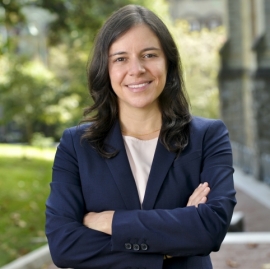
Maria Cuellar, PhD
Assistant Professor of Criminology; Statistics & Data Science; and Biostatistics
Dr. Maria Cuellar is an Assistant Professor at the University of Pennsylvania in the Department of Criminology, Department of Statistics and Data Science, and the Department of Biostatistics, Epidemiology and Informatics. Her training is primarily in statistics and data science, and her work is driven by interdisciplinary projects in public policy, public health, and forensic science.
Dr. Cuellar is interested in the intersection of statistics and the law, particularly how and whether one can answer legal questions by using statistics. She has written about nonparametric estimation in causal inference, as it relates to the legal question of whether one can attribute an outcome (e.g. cancer) to an exposure (e.g. exposure to a harmful chemical). Dr. Cuellar has also written about the statistical foundations of forensic science. For example, she has studied the proper way to state a conclusion in pattern-matching disciplines (e.g. fingerprints, hair microscopy, toolmarks identification) and what information a forensic examiner should not have access to when analyzing evidence. She is also working on an algorithm for toolmark identification.
She often serves as an expert witness and consultant in trials. She has discussed the statistical foundations of forensic science (in cases regarding hair microscopy and toolmarks) and the basis for statistical arguments in child abuse (shaken baby syndrome). She enjoys explaining complex statistical or machine learning ideas to a lay audience, especially in high-stakes situations, such as the law or public health.
Dr. Cuellar is currently serving as the Chair of the American Statistical Association’s Advisory Committee on Forensic Science. She is also a Faculty Fellow at the Crime and Justice Policy Lab at the University of Pennsylvania, a member of the Center for Causal Inference, and an affiliate of the Quattrone Center for the Fair Administration of Justice.
Content Area Specialties
Statistics, data science, public policy, forensic science, causal inference
Methodology Specialties
Causal inference, machine learning, experimental design, nonparametric statistics

